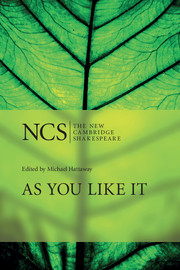Book contents
- Frontmatter
- Contents
- List of Illustrations
- Preface to the Updated Edition
- List of Abbreviations and Conventions
- Introduction
- Note on the Text
- As You Like It
- List of Characters
- The Play
- Textual Analysis
- Appendix 1 An Early Court Performance?
- Appendix 2 Extracts from Shakespeare’s Principal Source, Lodge’s Rosalind
- Appendix 3 The Songs
- Reading list
Appendix 3 - The Songs
- Frontmatter
- Contents
- List of Illustrations
- Preface to the Updated Edition
- List of Abbreviations and Conventions
- Introduction
- Note on the Text
- As You Like It
- List of Characters
- The Play
- Textual Analysis
- Appendix 1 An Early Court Performance?
- Appendix 2 Extracts from Shakespeare’s Principal Source, Lodge’s Rosalind
- Appendix 3 The Songs
- Reading list
Summary
Many pastoral works, Sidney's Arcadia and Lodge's Rosalind included, contain songs, and productions of As You Like It, which contains five songs, are often remarkable for their music. In fact there was a vogue for ‘operatised’ versions of the play in the first half of the eighteenth century. No settings of ‘Under the greenwood tree’ (1.5.1–8, 30–7, 42–9) or ‘Blow, blow, thou winter wind’ (2.7.174–97) have survived from Shakespeare's period; the earliest are those of Thomas Arne for the production of 1740 at Drury Lane. ‘O sweet Oliver’ from which Touchstone sings (3.4.75–81) is the name given in a lute-book compiled by Adrian Smout in Leyden to the tune ‘The hunt is up’. There is an arrangement of ‘What shall he have that killed the deer?’ (4.2.8–17) as a catch for four voices that was made by John Hilton, organist of St Margaret's Westminster (1599–1657), although it was not published until 1652. (It also appeared in J. Playford's The Musical Companion in 1667.) The fact that it does not contain the song's slightly puzzling ‘Then sing him home, /The rest shall bear this burden’ (see 4.2.10 n., 11 n.) implies that it may not have been used in theatrical performances.
‘It was a lover and his lass’ (5.3.12–43), which is very close to Corydon's song ‘A blithe and bonny country lass’, was set by Thomas Morley for voice, lute, and bass-viol, and appeared in his First Book of Airs, or Little Short Songs, 1600, sigs. B4v–CIr. We cannot tell whether it was written specially for the play, or taken over by Shakespeare. The order in which the stanzas are printed in the song-book would seem to be more appropriate than that in which they appear in the Folio text (see 5.3.36–43 n.).
- Type
- Chapter
- Information
- As You Like It , pp. 239Publisher: Cambridge University PressPrint publication year: 2009

